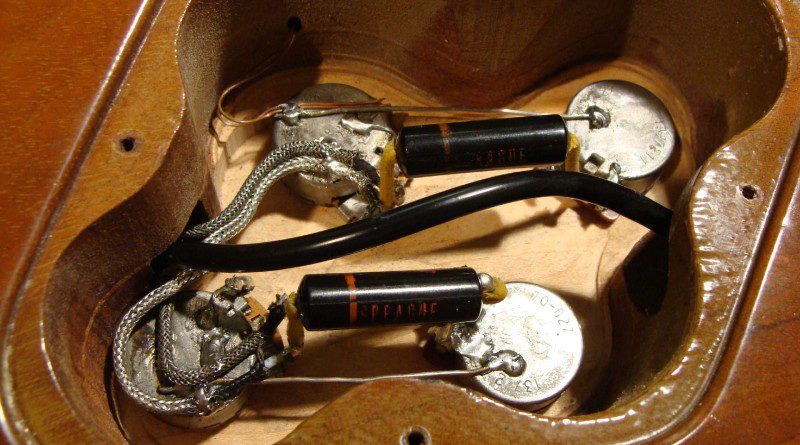Guitars are often subjected to use under fairly extreme circumstances, especially those being used in live performances. Sweat, dirt, and grime can accumulate all over the guitar, and this includes the sensitive electronic and electrical components.
Electrical contact cleaning solution is a great way to clean these parts without causing damage to them or otherwise interfering with their proper operation, but what happens when you’re unable to access electrical contact cleaner or don’t have it in your cleaning kit?
In this KillerGuitarRigs Guide, you’ll learn:
- What happens to a guitar with dirty electrical contacts?
- What are some good electrical contact cleaner substitutes?
- What should I avoid using to clean electrical contacts?
- What precautions should I take when cleaning electrical contacts?
Before moving on to the guide, check out these fast facts:
- Dirty electrical contacts can cause potentiometer malfunction
- Not all alcohol is suitable for cleaning contacts
- Pure isopropyl alcohol and nail polish remover are good alternative products
- Contact cleaner substitutes can cause damage to your guitar’s finish if mishandled
Contents
What Happens to a Guitar With Dirty Electrical Contacts?
When a guitar’s electrical contacts become dirty, the pathways for current to flow are impeded. Since the electronics cavities of guitars are generally hidden away, the effects are usually only realized at the most inconvenient times, manifesting in the form of crackles, pops, increased hum, and in some cases dead zones and dropoffs in your tone or volume pots.
The areas most likely to see problems associated with dirt are your jack socket, pickup selector switches, and your potentiometers, as they’re the most exposed to the outside environment.
Regular preventative cleaning will prevent issues from developing in the first place, but if you do start to notice any of these symptoms, you should intervene quickly to prevent any lasting damage to components by potentially acidic dirt.
What Are Some Good Electrical Contact Cleaner Substitutes?
Electrical contact cleaner isn’t always readily available, so if you need to clean your contacts, but can’t get your hands on any, here are some great electrical contact cleaner substitutes.
Isopropyl Alcohol
When using isopropyl alcohol as a contact cleaner, you must be sure to use the purest grade possible. Look for an IPA (isopropyl alcohol) 99%. This grade of alcohol will dissolve a range of contaminants including oils from the skin, nicotine deposits, dead skin, and more. 99% Purity IPA cleans well and dries quickly, which is exactly what you want in an electrical contact cleaner.
Acetone
Acetone, commonly known as nail polish remover, is an extremely powerful solvent that makes for an excellent electrical contact cleaner. As with pure isopropyl alcohol, it quickly dissolves much of the grime that accumulates on guitars during use, and it dries even faster, leaving no residue.
What Should I Avoid Using to Clean Electrical Contacts?
While it may be ok to use these products to clean electrical contacts in some settings, they aren’t appropriate for use on a guitar’s delicate components and should not be considered viable electrical contact cleaner substitutes for this purpose.
WD-40
WD-40, which is a lubricant and water dispersant, can loosen and dissolve grime, but it will leave a significant amount of residue and a greasy lubricant film. This will become a magnet for dirt and will likely make the problem even worse.
Vinegar
Vinegar is a mild acid and is used for a lot of cleaning purposes, but it takes a long time to dry. If you leave any moisture behind and it’s not dried by the time you plug in the guitar again, you risk creating shorts which will cause real damage to the electrical components.
Water
Water is full of mineral deposits and other contaminants that will very quickly cause oxidization, or rust, on the electrical components of your guitar. Not only will this cause more crackles, pops, and other unwanted noises, but it can also irreparably damage them, requiring replacement. In addition, much like vinegar, water doesn’t dry quickly, which always leaves the potential for hidden moisture remaining on the contacts.
Rubbing Alcohol
Many people have rubbing alcohol around their homes and may assume it to be the same, but rubbing alcohol typically has around 50 isopropyl alcohol content, meaning there are more ingredients in the mixture. More ingredients means there’s a bigger chance of residue being left behind. Residue not only attracts dirt and grime, but also provides the perfect surface for them to adhere to, which will very quickly land you back you right back where you started.
What Precautions Should I Take When Cleaning Electrical Contacts?
As inconvenient as it may seem, you must completely remove all components you plan to clean from the guitar and set them up in a separate place prior to cleaning. Isopropyl alcohol, and acetone even more so, will cause significant damage to paint and finish if coming into contact with your guitar’s body. Acetone will not only damage paint finish, but is actually capable of dissolving certain plastic components. While not quite as damaging, 99% purity IPA can cause yellowing of plastics.
You should also be sure to clean your components in a clean, tidy space. Use compressed air to blow any debris from your workspace, then use it to blow any large dirt particles out of the electrical components you’re cleaning. Keeping the area clear of dirt and dust will give you the best chance of avoiding putting that debris right back into the guitar.
Finally, for scrubbing the components, be sure to use a micro brush with fine bristles. Using a Q-Tip or other cotton swab will likely leave fibers on the components, which will cause connection issues and will also become attractants for more dirt.
Final Thoughts on Contact Cleaner Substitutes
While it’s always best to use purpose-made products for cleaning, there will always be times when they simply aren’t available. By using these alternative products, you’ll still be able to keep your guitar’s electrical contacts clean, which will prevent unwanted noise from cutting through the mix during performances or recording sessions.
Main image courtesy of TT Zop on Wikimedia
Check out these other articles you might like:



I have been using Inox MX3 on many parts of music equipment (including pots) for decades.
Don’t think I will ever find a reason to stop using it.
Why a substitute when good electric contact cleaners are available and no more expensive? I use WD40 Contact Cleaner (NOT THE SAME AS WD40 OIL!).
Acetone (aka nail varnish remover) is a very strong solvent, I would go near my guitar with it.
… I mean “would NOT” in last sentence.